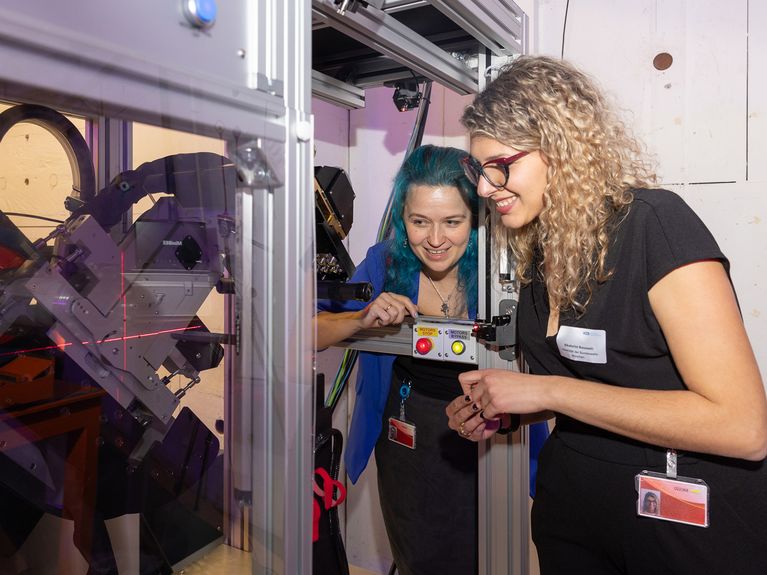
Story #09
Open for Companies and Their Ideas: Our Innovation Platforms
Many of our research facilities are among the most modern in their field – a fact that we want the economy and society to also profit from. Accordingly, our Innovation Platforms offer access to highly advanced equipment and labs – and consulting on application aspects for new business ideas.
Each year, thousands of scientists from Germany and abroad use our unparalleled research assets, which include particle accelerators and medical labs, research vessels and cutting-edge computing centers. But our equipment and infrastructures aren’t reserved for science alone: we also offer access to companies and social organizations.
In this way, we want to play a major part in driving innovation – for example, by helping small and medium-sized companies to develop new business ideas and technologies that are so research-intensive they’re virtually impossible for them to pursue on their own. Our experts are there to advise them.
At Helmholtz, our 16 Innovation Labs represent a key resource for transferring new ideas into practice: small and agile think tanks designed to rapidly and efficiently take innovative technologies with considerable potential to the application phase. One example: OPTSAL, an Innovation Lab from the German Aerospace Center (DLR), which combines a range of drone-based camera technologies for aerial photography to offer helpers detailed images of their surroundings in natural disasters or emergency response contexts. Or the 3D-US Lab at the Helmholtz Centre Potsdam – German Research Centre for Geosciences (GFZ), which works together with companies to develop subterranean exploration technologies for mining and tunnel construction. At the same time, our three Innovation Platforms offer broader access to our research infrastructures: pooling the resources of multiple Helmholtz Centers, they welcome requests from companies and social organizations on specific research topics.
Helmholtz Innovation Platform for Accelerator-based Technologies & Solutions – HI-ACTS
For example, SOOP is jointly coordinated by GEOMAR Helmholtz Centre for Ocean Research in Kiel, the Helmholtz-Zentrum Hereon, and the Alfred Wegener Institute (AWI). The Platform’s focus is on developing new instruments for marine research, like a new camera for monitoring plankton that can be installed e.g. on ocean liners and private sailboats. In this approach, companies, private citizens, and researchers can work together to gather valuable oceanographic and climate-relevant data. By jointly developing new instruments and analyzing data with the SOOP actors, the goal is not only to gain new insights into seawater, but also to develop innovative early-warning systems or information services for ships of all kinds.
SolarTAP is jointly operated by Forschungszentrum Jülich, Helmholtz-Zentrum Berlin and Karlsruhe Institute of Technology. Together with partners from the business and research communities, the Platform develops films with embedded solar cells. By covering buildings, agricultural fields, and roadways with the films, previously untapped areas can contribute to the energy transition. To help the technology reach its full potential, Solar TAP offers its industrial partners access to specialized production facilities, printers, and “living labs” for the solar films.
In turn, HI-Acts offers companies access to advanced particle accelerator technologies. Here, the Deutsches Elektronen-Synchrotron DESY, the Helmholtz-Zentrum Dresden-Rossendorf, Helmholtz-Zentrum Berlin, GSI Helmholtzzentrum für Schwerionenforschung and the Helmholtz-Zentrum Hereon work together. Through the network, industrial partners gain access to 22 particle accelerators, allowing them to pursue research into e.g. new materials for semiconductors or test active ingredients for new medications. The Platform has already produced a number of important innovations, such as new, more durable plastics for storing hydrogen, and an improved laser welding method for use in electric vehicles. Together with partner companies from France, the experts at HI-Acts are also working to optimize laser diagnostics for cancer.
In this way, our highly specialized research facilities can also help companies get ahead – and benefit society as a whole.
Bild: HZB/Kevin Fuchs
Participating centers
- AWI
Alfred Wegener Institute, Helmholtz Centre for Polar and Marine Research
- DESY
Deutsche Elektronen-Synchrotron DESY
- Jülich
Forschungszentrum Jülich
- Geomar
GEOMAR Helmholtz Centre for Ocean Research Kiel
- GSI
GSI Helmholtzzentrum für Schwerionenforschung
- HZB
Helmholtz-Zentrum Berlin für Materialien und Energie
- HZDR
Helmholtz-Zentrum Dresden-Rossendorf
- Hereon
Helmholtz-Zentrum Hereon
- KIT
Karlsruhe Institute of Technology